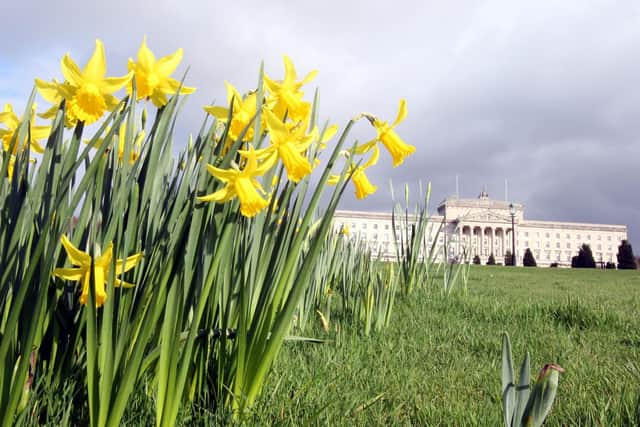Owen Polley: Disrespect to unionists exposes Sinn Fein’s threadbare ‘New Ireland’ rhetoric


Sinn Fein, its allies and its proxies have played a prominent role in promoting this way of thinking.
They claim that unionists have been invited to join a ‘respectful’ conversation aimed at creating an ‘inclusive’ and ‘progressive’ 32-county republican state.
Advertisement
Hide AdAdvertisement
Hide AdThis language is chosen to appeal to people who see themselves as more reasonable, rational and, let’s face it, superior to those of us who have a fixed preference for remaining in the UK.
But do buzzwords like ‘shared’, ‘respectful’ and ‘inclusive’ really mean anything in the context of Northern Ireland’s proposed destruction? Most of the evidence suggests that they do not and we’ve seen two good examples this week.
First, there was the saga of the Queen’s platinum jubilee tree.
The DUP MLA, Joanne Bunting, asked for permission to plant this piece of greenery on the Stormont estate, as part of the ‘Green Canopy’ project. This is a royal initiative encouraging people to “plant a tree for the jubilee”, as an environmentally sound way of marking the 70th anniversary of the Queen taking the throne.
Advertisement
Hide AdAdvertisement
Hide AdBunting’s proposal should have been uncontroversial but, unfortunately, the finance department has responsibility for the grounds around the Assembly and it is led by Sinn Fein’s Conor Murphy. The request to plant a tree was denied.
In an attempt to explain, the minister released a statement. “My department’s policy on commemorative structures or planting on the grounds of the Stormont estate is to approve only those requests which commemorate international events.”
If nothing else, this explanation was consistent, as it is not the first time Sinn Fein has vetoed horticulture it sees as too unionist friendly. Last year Murphy prevented the planting of a rose bush at Stormont to mark Northern Ireland’s centenary.
The party may see everything through the greenest tinted spectacles, but it cannot be accused of being overly green-fingered.
Advertisement
Hide AdAdvertisement
Hide AdOn Twitter, a former Fianna Fail candidate, Fintan Cox, described its latest decision as “shockingly petty... bordering on sectarian hatred ... a bloody tree!” There was widespread incredulity on social media that Murphy could block such a harmless gesture.
Later in the week, though, Sinn Fein was involved in a similar incident and this time it complained about ... a book!
The offending volume, ‘Conspicuous Gallantry’ by Anthony Leask, was visible behind the TUV leader, Jim Allister, during a Stormont committee video meeting.
Maoliosa McHugh, one of Sinn Fein’s burgeoning phalanx of unelected MLAs, interrupted the call to ask the Assembly clerk for an investigation into the permissibility of displaying the publication. ‘Conspicuous Gallantry’ records stories from the men and women of the 8th (County Tyrone) Battalion of the UDR.
Advertisement
Hide AdAdvertisement
Hide AdSinn Fein and others have long tried to demonise this regiment, which suffered horrific casualties during the Troubles, portraying the crimes of a few rogue soldiers as systemic ‘collusion’ with loyalist paramilitaries.
Allister responded, “Having blocked a centenary stone, a rose bush ... and a tree planted for Her Majesty’s jubilee, republicans now ... try to dictate the contents of my study!” McHugh justified his intervention by claiming, “Workplaces should be neutral spaces.”
By this logic, anyone who occasionally works from home should conduct an equality audit of their bedrooms or kitchens, before taking their next Zoom call. The imperative to take offence can call for ingenuity at times.
A contemptuous attitude to anything associated with unionism, by people who claim they wish to be respectful, is not confined to Sinn Fein. You hear similar things from nearly all the leading voices in the various campaigns for a ‘shared’ or ‘new’ Ireland.
Advertisement
Hide AdAdvertisement
Hide AdIndeed, it is almost a prerequisite for anyone who pushes this view in the media, or even just on Twitter or podcasts.
The implication is that unionists must shape the 32 county state while they can, because their place in the United Kingdom and their hopes for Northern Ireland’s future are about to be destroyed.
These frequent outbursts actually epitomise neatly the latest wave of nationalist campaigning and it is genuinely useful to have such plain-speaking. It’s a necessary counterpoint to meaningless platitudes about sharing and respect.
These campaigners are all smiles and kind words while the ‘conversation’ about Northern Ireland’s constitutional position remains entirely on their terms. When unionists articulate alternative ideas about the future or challenge nationalist assumptions, the smiles soon disappear to reveal ugly and laughably premature Irish nationalist triumphalism.
Advertisement
Hide AdAdvertisement
Hide AdSo long as we hear plenty of that and Sinn Fein keep making petty decisions, fewer naive people, at least, will be taken in by empty rhetoric about a ‘new Ireland’.
——— ———
A message from the Editor:
Thank you for reading this story on our website. While I have your attention, I also have an important request to make of you.
With the coronavirus lockdowns having had a major impact on many of our advertisers — and consequently the revenue we receive — we are more reliant than ever on you taking out a digital subscription.
Subscribe to newsletter.co.uk and enjoy unlimited access to the best Northern Ireland and UK news and information online and on our app. With a digital subscription, you can read more than 5 articles, see fewer ads, enjoy faster load times, and get access to exclusive newsletters and content.
Visit
now to sign up.
Advertisement
Hide AdAdvertisement
Hide AdOur journalism costs money and we rely on advertising, print and digital revenues to help to support them. By supporting us, we are able to support you in providing trusted, fact-checked content for this website.
Ben Lowry, Editor